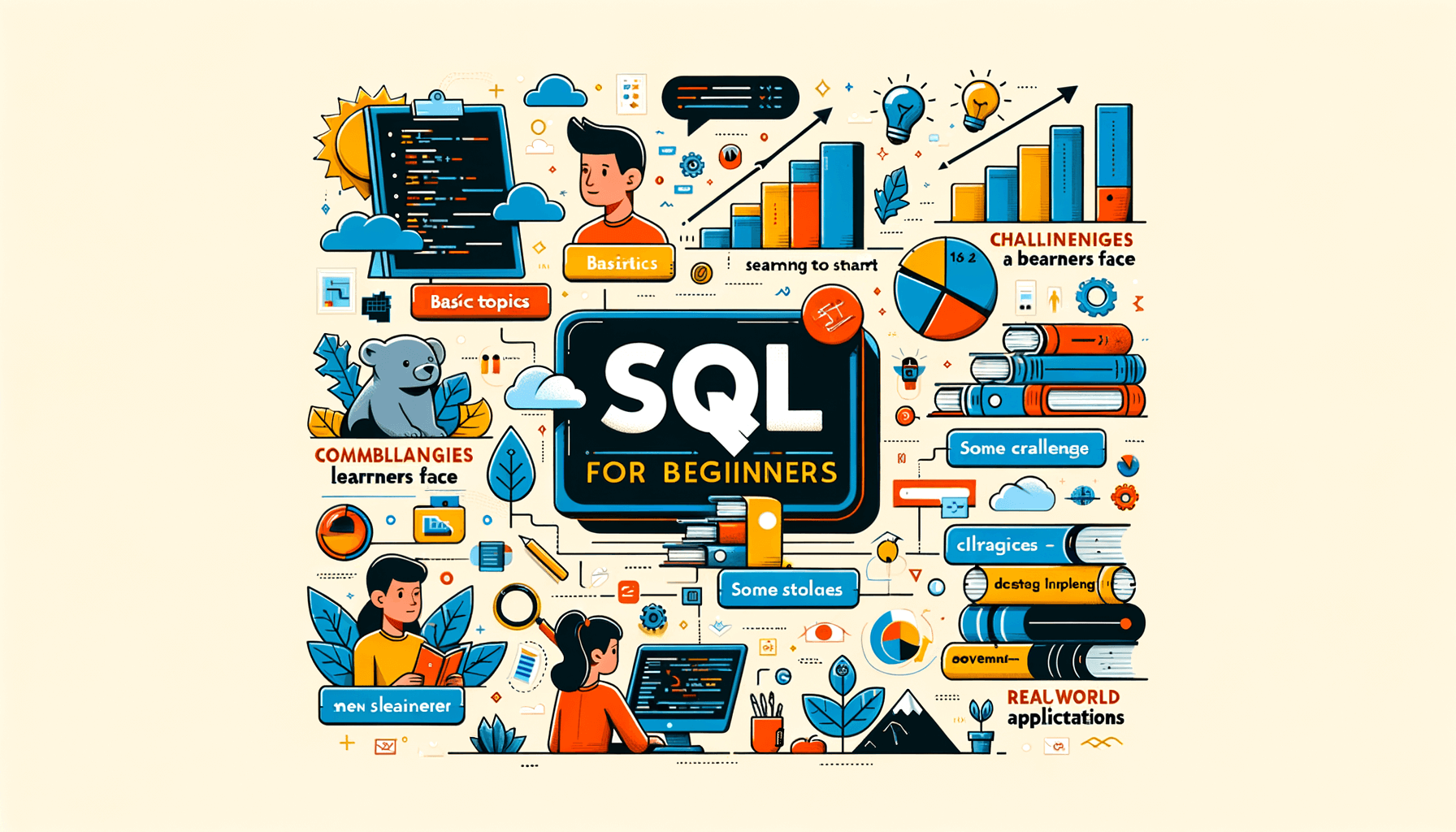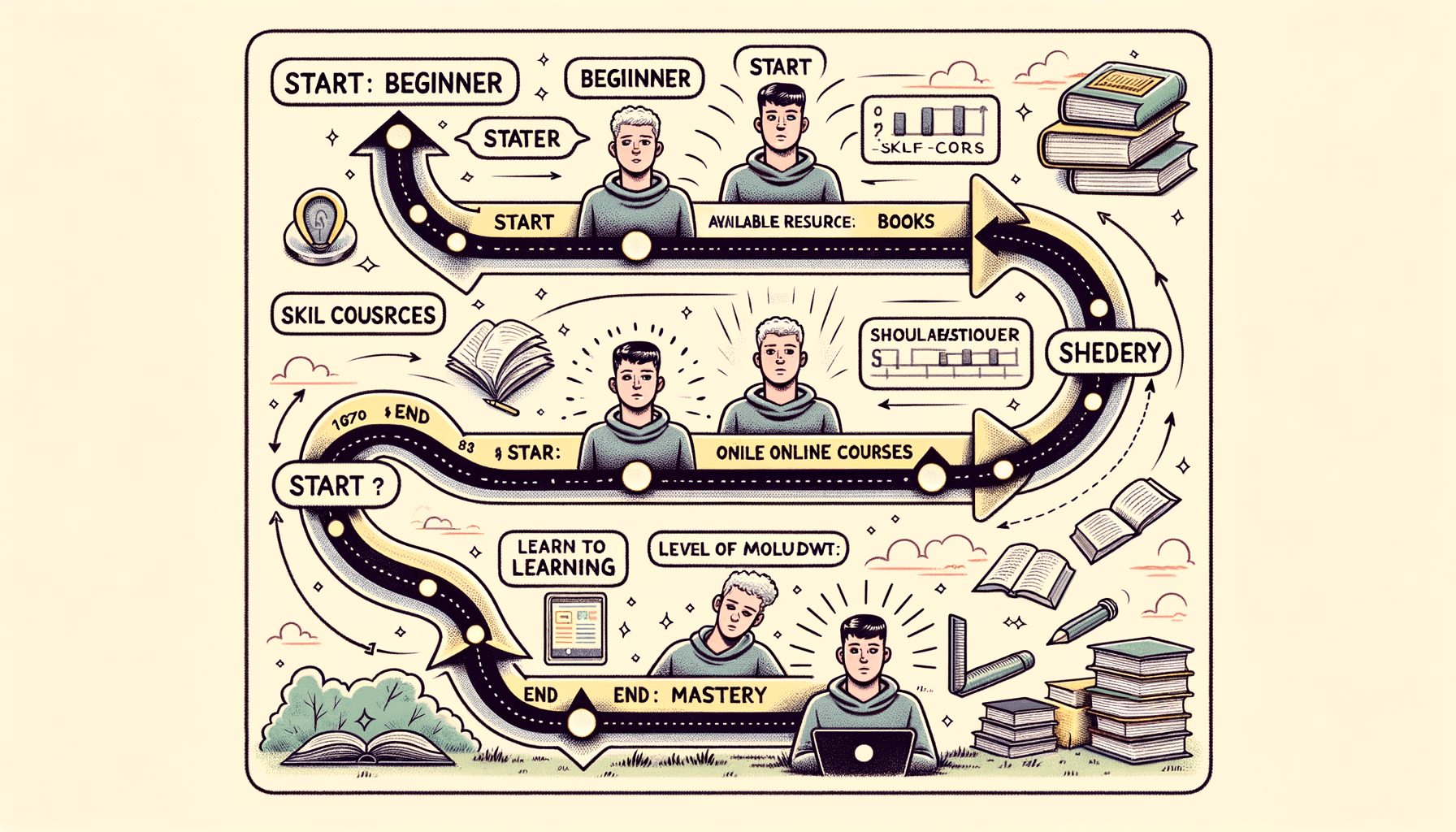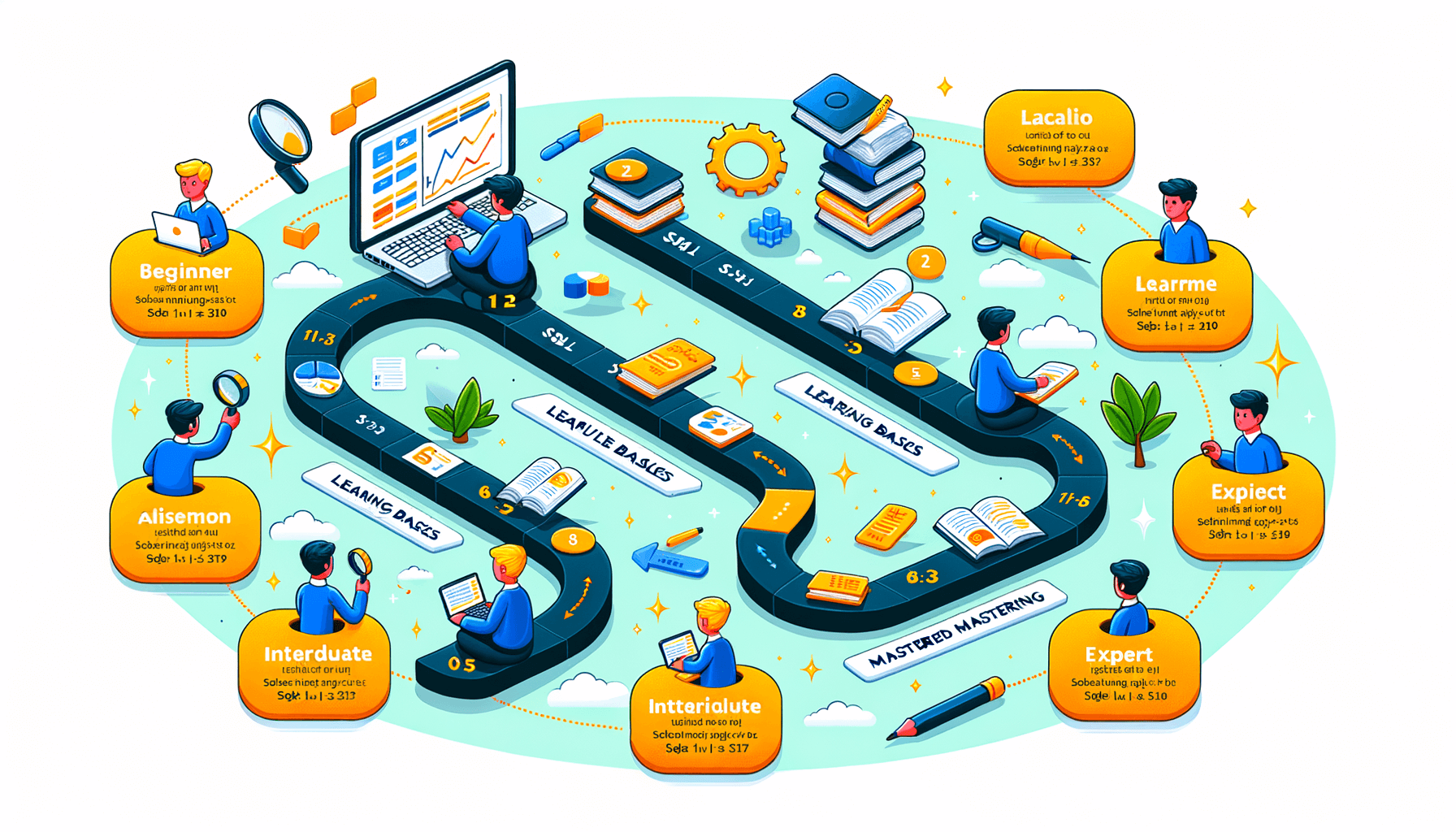A big variety of articles and resources

Is SQL Easy to Learn? Unveiling the Truth for Beginners
 Sia Author and Instructor
Learn SQL
Sia Author and Instructor
Learn SQL
9 minute read
Learning SQL can seem hard for beginners, but it's actually easy to pick up. SQL, or Structured Query Language, is used to talk to databases. It's important for many jobs in data analysis, web development, and business intelligence. This article will explore what makes SQL easy or hard to learn and give tips for getting better at it.
Key Takeaways
- SQL is a language for managing data in databases and is used in many fields.
- Unlike other programming languages, SQL is declarative, meaning you tell it what you want, not how to do it.
- Beginners often find SQL's syntax and query structure challenging but manageable with practice.
- Using online resources, practical exercises, and joining communities can make learning SQL easier.
- SQL skills have real-world applications in data analysis, web development, and business intelligence.
Understanding the Basics of SQL
What is SQL?
SQL, or Structured Query Language, is a standard language used to communicate with databases. It allows us to create, read, update, and delete data stored in a relational database. SQL is essential for managing and manipulating data efficiently.
Core Concepts and Terminology
To get started with SQL, we need to understand some basic concepts and terms:
- Tables: Structures that store data in rows and columns.
- Queries: Commands used to retrieve data from tables.
- Primary Key: A unique identifier for each record in a table.
- Foreign Key: A field in one table that links to the primary key in another table.
Importance of SQL in Data Management
SQL plays a crucial role in data management. It helps us organize and analyze large amounts of data quickly. With SQL, we can:
- Filter and sort data to find specific information.
- Join tables to combine related data from different sources.
- Perform calculations and generate reports.
Mastering SQL opens up many opportunities in fields like data analysis, web development, and business intelligence.
Comparing SQL with Other Programming Languages
SQL vs. Procedural Languages
When we compare SQL to procedural languages like Python or Java, we notice a big difference in how they work. Procedural languages follow a step-by-step approach to solve problems, while SQL focuses on what data we want to retrieve. This makes SQL more about declaring our needs rather than detailing the steps to get there.
Declarative Nature of SQL
SQL is a declarative language, which means we tell the database what we want, and it figures out how to get it. This is different from procedural languages where we have to write out each step. This can make SQL easier to learn for some people because we don't need to worry about the process, just the result.
Ease of Learning SQL Compared to Others
Learning SQL can be easier than learning other programming languages because it has a simpler syntax and focuses on data manipulation. However, it can still be challenging due to its unique way of handling data. Beginners might find it helpful to start with basic queries and gradually move to more complex ones.
While SQL might seem easier at first, mastering it requires practice and understanding of how databases work. The journey from writing simple queries to handling complex data operations is both rewarding and essential for many tech careers.
Common Challenges Faced by SQL Beginners
Syntax and Query Structure
When starting with SQL, one of the first hurdles is understanding its syntax and query structure. Unlike other programming languages, SQL has a unique way of structuring commands, which can be confusing at first. Getting the hang of SELECT, FROM, and WHERE clauses is crucial for writing basic queries. Beginners often struggle with the order of these clauses, leading to errors and frustration.
Complexity of Joins and Subqueries
Another significant challenge is mastering joins and subqueries. These are essential for combining data from multiple tables, but they can be tricky to understand. There are different types of joins—INNER JOIN, LEFT JOIN, RIGHT JOIN, and FULL JOIN—each serving a specific purpose. Subqueries, or queries within queries, add another layer of complexity. Understanding how to nest queries correctly is vital for advanced data manipulation.
Error Handling and Debugging
Error handling and debugging are also common pain points. SQL error messages can be cryptic, making it hard to identify what went wrong. Beginners often find it challenging to debug their queries, especially when dealing with large datasets. Learning to read and interpret error messages is a skill that comes with practice.
Mastering SQL involves overcoming these initial challenges, but with persistence and the right resources, anyone can become proficient.
Effective Strategies for Learning SQL
Utilizing Online Resources
When starting with SQL, online resources can be incredibly helpful. Websites like [sqlskillz.com vs codecademy.com](https://sqlskillz.com) offer courses that are perfect for beginners. You can learn at your own pace, and there's no need for a credit card to sign up. These platforms provide a structured way to master SQL basics.
Practical Exercises and Projects
To truly understand SQL, you need to practice. Working on real projects helps you apply what you've learned. Try creating your own database or working on sample projects. This hands-on approach makes the concepts stick.
Joining SQL Communities and Forums
Being part of a community can make learning SQL easier. Forums and online groups let you ask questions and get answers from experienced users. It's a great way to solve problems and learn new tips. Plus, you can share your own experiences and help others.
Bold: Practice and community support are key to mastering SQL. They provide the practical experience and peer assistance that make learning more effective.
Real-World Applications of SQL Skills
SQL is a powerful tool for data analysis. It allows us to extract, manipulate, and analyze large datasets efficiently. Data analysts often use SQL to generate reports, identify trends, and make data-driven decisions. By mastering SQL, we can handle complex queries and transform raw data into meaningful insights.
In web development, SQL is essential for managing databases that store user information, content, and other critical data. Developers use SQL to create, read, update, and delete data in databases. This ensures that web applications run smoothly and can handle user interactions effectively. Learning SQL is crucial for anyone looking to build dynamic and data-driven websites.
Business intelligence relies heavily on SQL to gather and analyze data from various sources. By using SQL, we can create dashboards, generate reports, and perform advanced analytics. This helps businesses make informed decisions and improve their operations. SQL skills are invaluable for professionals in the business intelligence field.
Mastering SQL opens up numerous opportunities in various fields, from data analysis to web development and business intelligence. It's a versatile skill that can significantly enhance our career prospects.
Evaluating the Learning Curve of SQL
Initial Learning Phase
When we first start learning SQL, it can seem a bit overwhelming. The syntax and structure are different from other languages. However, with resources like sqlskillz.com vs w3schools.com, we can master the basics at our own pace. This phase is all about getting comfortable with the basics.
Intermediate Proficiency
As we move to the intermediate level, we start to understand more complex queries. This includes learning about joins, subqueries, and other advanced topics. At this stage, practice is key. We should work on real-world projects to solidify our skills.
Advanced Mastery
Reaching advanced mastery in SQL means we can handle any data-related task. We can optimize queries for better performance and understand the intricacies of database management. This level requires continuous learning and staying updated with the latest trends and best practices.
The journey to mastering SQL is a gradual process, but with dedication and the right resources, anyone can achieve proficiency.
Resources and Tools to Aid SQL Learning
Books and Tutorials
Books and tutorials are great for learning SQL. They offer step-by-step guides and detailed explanations. Some popular books include "SQL for Dummies" and "Learning SQL" by Alan Beaulieu. These resources help you understand the basics and advanced topics at your own pace.
Interactive Learning Platforms
Interactive platforms like Codecademy and Khan Academy provide hands-on experience. They offer exercises and projects that make learning fun and engaging. These platforms allow you to practice SQL queries in real-time, which helps reinforce your understanding.
SQL Practice Databases
Practice databases are essential for mastering SQL. Websites like SQLZoo and LeetCode offer a variety of problems to solve. These platforms let you apply what you've learned in a practical setting. You can also download sample databases to work on your own machine.
Utilizing these resources can significantly speed up your learning process. They offer a mix of theory and practice, making it easier to grasp complex concepts.
By using these tools, you can learn SQL basics for beginners at your own pace. No credit card required. Login or sign up to start learning with SQLSkillz.
Looking to master SQL? Our website offers a variety of resources and tools to help you learn. From beginner courses to advanced modules, we have something for everyone. Visit us today and start your journey to becoming a SQL expert!
Conclusion
In summary, learning SQL can be both easy and challenging, depending on your background and approach. For beginners, SQL offers a straightforward syntax and clear commands, making it accessible. However, mastering SQL requires practice and understanding of more complex queries and database management concepts. With dedication and the right resources, anyone can become proficient in SQL. So, whether you're a student, a professional, or just curious, SQL is a valuable skill worth learning.
Frequently Asked Questions
What is SQL and why is it important?
SQL, or Structured Query Language, is a tool used to manage and manipulate databases. It's important because it helps you store, retrieve, and manage data efficiently.
Is SQL harder to learn than other programming languages?
SQL is generally considered easier to learn compared to many other programming languages because it uses simple, English-like statements.
What are some common challenges beginners face when learning SQL?
Beginners often struggle with understanding the syntax, structuring queries, and dealing with joins and subqueries. Debugging errors can also be tricky.
What are effective ways to learn SQL?
Using online resources, doing practical exercises, and joining SQL communities can be very helpful. Working on real projects also makes learning more effective.
How is SQL used in the real world?
SQL is used in various fields like data analysis, web development, and business intelligence. It helps in managing and analyzing large sets of data.
What resources can help me learn SQL?
Books, online tutorials, interactive learning platforms, and practice databases are great resources to help you learn SQL.
Related Articles

How Hard Is It to Learn SQL? A Comprehensive Guide
9 minute read

How Long Does It Take to Learn SQL?
9 minute read





